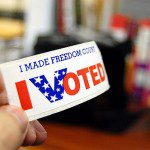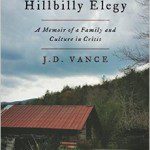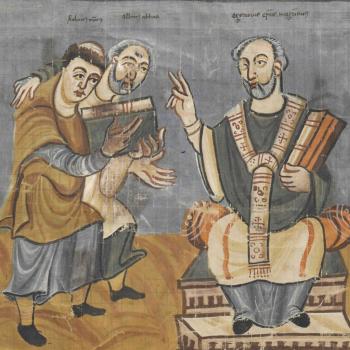For me, Election Day is both exciting and nerve-wracking, as I simultaneously celebrate the joys of democratic citizenship and wish that we could just get to the results and move on. If that describes you, I thought I’d curate some reading material from our archives to help you get through the day. I’ll give you two sets of posts:
“I can’t get enough politics: give me something more to read about this election.”
You’re in luck, since most of us have written at least one election-related post this past summer and fall. In case you missed any of them, that group of posts includes:

• Kristin performing a linguistic analysis of the two major-party candidates’ distinctive habits of speech (July 28): “The national party conventions of the past two weeks have offered us political theatrics, stolen words, and soaring rhetoric. They also provide us with a moment to reflect on the paths each candidate has taken to secure their party’s nomination. More specifically, to consider the words they have employed to peddle their contrasting visions for the nation’s future.”
• Beth’s response to theologian Wayne Grudem’s (initial) endorsement of Donald Trump, and what she suspected it said about his views on women in leadership (July 31): “I sensed desperation in Professor Grudem’s defense of Trump–desperation to try and convince his fellow Christians that Trump must be the best option for Christians. The only other option is a woman, and surely–according to Professor Grudem’s understanding of the world–that would not, could not, be God’s best for America.”
• Philip’s suggested readings for a hypothetical “Trump 101” course (August 7), including the 1946 novel All the King’s Men, in which author Robert Penn Warren “shows how populism and demagoguery often begin as sincere and well-intentioned responses to deep-laid discontent and perceptions of injustice.”
• Tal finding “one small glimmer of light in the larger darkness” (August 15): namely, “that this election cycle offers a welcome opportunity for teaching about modern ethical theory.”

• John’s prediction about the Mormon vote in this election (September 1): “One should not forget… just how reliable Republican Mormon voters have been. More reliably Republican than any other religious group.”
• David’s suggestion that evangelicals disillusioned by the realpolitik of the two-party system should consider how another Christian tradition understands politics (September 28): “It’s a good time to invest in a robust theology of shalom. It’s a good time to be an Anabaptist.”
• Agnes delving into the historical context for comments about Hillary Clinton’s “presidential ‘look’” (October 3): “In some ways American mores, along with American politics, have come around: we judge pantsuits problematic now because they seem too modest. We should be long past a point where a candidate’s pantsuit or shoes deserve any comment at all within political discourse.”
• Chris tentatively suggesting some “unpleasant parallels” to the relationship of religion and politics in 1930s Germany (October 18): “…I tend to think we overreach with most historical analogies…. But if we Christians are going to insist on drawing analogies between the German past and the American present, maybe we ought to look beyond Bonhoeffer.”
• Tim proposing that “evangelical” was, to some extent, a market segment constructed by political pollsters (November 3): “‘Evangelicals’ in this sense were not an untapped segment of voters that pollsters discovered, it was one they created.”
“I’m done: give me something to read about anything else other than the election.”
Then you’ve still come to the right place! Behold, each Anxious Bench contributor’s most popular non-political post from the summer and fall:
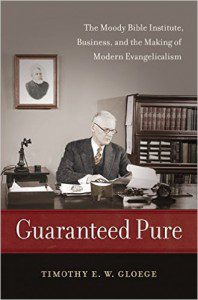 • Tim introduced the category of “corporate evangelicals” (June 16): “Corporate evangelicals are, above all, impeccable consumers of both spiritual and secular goods. Their preferences can vary considerably from each other… But whatever the flavor, their choices are tasteful, avoiding ostentation and kitsch. Their chosen church will hew closely to their preferred variety of evangelical orthodoxy, but also will avoid excessive rancor.”
• Tim introduced the category of “corporate evangelicals” (June 16): “Corporate evangelicals are, above all, impeccable consumers of both spiritual and secular goods. Their preferences can vary considerably from each other… But whatever the flavor, their choices are tasteful, avoiding ostentation and kitsch. Their chosen church will hew closely to their preferred variety of evangelical orthodoxy, but also will avoid excessive rancor.”
• Chris introduced readers to an oft-overlooked group of Baptists in America (June 21): “It might be argued that the BGC doesn’t deserve as much attention as the Southern Baptists, American Baptists, or the half-dozen other Baptist groups claiming more than its quarter-million adherents. But especially since it began to outgrow its immigrant origins after World War II and associate more closely with the neo-evangelical movement, the Baptist General Conference has wielded influence out of proportion to its numbers.”
• Philip compared the declines of Christianity in the Middle East and Buddhism in India (June 27): “Although it’s a world religion, in a sense it is multiply cut off from its roots. While its key early figures used one language, its scriptures are translations of those early words. And although it was once very strong in the land of its birth, it subsequently became much more numerous in lands far afield, while it virtually died in that first homeland…. I am referring of course to Buddhism. Or Christianity.”
• Tal wondered if the European Union was headed the way of Yugoslavia (July 18): “Historical comparisons always beg questions. But at least three similarities between the EU and Yugoslavia merit mentioning. First, both represent elite political constructions that too often failed to take into consideration views from “below,” from the governed. Second, both represent attempts to paper over longstanding divisions and patterns of mistrust among various regions, trusting that economic and political manipulations alone can work such magic. Finally, given their fragile, constructed nature both were/are highly susceptible to larger historical forces.”
• David shared a talk he gave to new students at Asbury University (August 17): “I don’t wish for you lives of wealth and comfort. I don’t want you to extract an optimal cost-benefit ratio from your experience. Instead, I urge you to immerse yourself in this complex, mysterious community. If that’s your goal, you’ve come to the right place. Asbury is a terrific place to irrigate deserts.”
• Agnes shared a now-forgotten book on reproductive health whose most famous fan was the Russian writer Leo Tolstoy (September 5): “The novelist urged the book upon ‘every thoughtful woman,’ who would find in it a kind of liberating health regime. Women had ‘not the slightest necessity…to continue living so blindly as old women and young girls have been living,’ but could use [Alice Bunker] Stockham’s prescriptions to ‘find better ways of living.'”
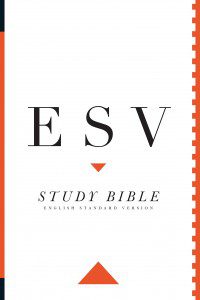 • Kristin wrote an open letter to the committee in charge of the English Standard Version (ESV) of the Bible (September 22): “…I want to suggest that if your purpose was to produce the most trustworthy translation of the Bible in the English language, if you hoped to achieve an unchanging version that will stand in perpetuity, then your decision to exclude women was a grave mistake.”
• Kristin wrote an open letter to the committee in charge of the English Standard Version (ESV) of the Bible (September 22): “…I want to suggest that if your purpose was to produce the most trustworthy translation of the Bible in the English language, if you hoped to achieve an unchanging version that will stand in perpetuity, then your decision to exclude women was a grave mistake.”
• Beth challenged the “modern roots” of the mistaken belief that Halloween is a pagan holiday (October 5): “Doesn’t it seem ironic that [James] Frazer’s attempt to discredit Christianity has become–whether knowingly or not–a primary resource used by Christians to discredit ‘pagan’ holidays like Halloween?”
• John reflected on the alienation and ambivalence that many evangelical scholars seem to feel about evangelicalism itself (October 27): “…a sense of diminished connection is not the same thing as disavowal. As Ronald Wells once commented, if one wanted to resign from evangelicalism, how would one go about it? I suppose one could denounce it, but what exactly would one be denouncing? And whom? There are too many evangelicals, past and present, with whom I feel a connection and indebtedness. They nurtured my faith. They inspired my scholarship. They challenge me. They fellowship with me. Ambivalently evangelical. Not much of a rallying cry.”


